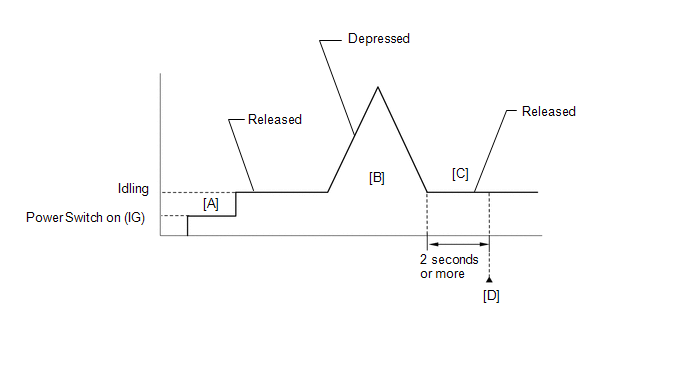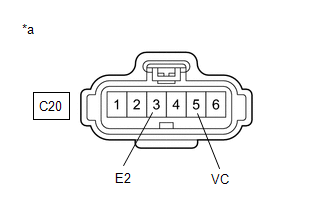- DTC judgment completed
- System normal
| Last Modified: 05-13-2024 | 6.11:8.1.0 | Doc ID: RM1000000026JSA |
| Model Year Start: 2023 | Model: Corolla | Prod Date Range: [09/2022 - ] |
| Title: 2ZR-FXE (ENGINE CONTROL): SFI SYSTEM: P21352B; Throttle/Pedal Position Sensor/Switch "A"/"B" Voltage Correlation Signal Cross Coupled; 2023 - 2025 MY Corolla Corolla HV [09/2022 - ] | ||
|
DTC |
P21352B |
Throttle/Pedal Position Sensor/Switch "A"/"B" Voltage Correlation Signal Cross Coupled |
DESCRIPTION
Refer to DTC P012011.
|
DTC No. |
Detection Item |
DTC Detection Condition |
Trouble Area |
MIL |
Memory |
Note |
|---|---|---|---|---|---|---|
|
P21352B |
Throttle/Pedal Position Sensor/Switch "A"/"B" Voltage Correlation Signal Cross Coupled |
The difference between the output voltage of VTA1 and VTA2 is 0.02 V or less for 2 seconds or more (1 trip detection logic). |
|
Comes on |
DTC stored |
|
MONITOR DESCRIPTION
VTA1 and VTA2 should never be close to the same voltage level. If VTA1 is within 0.02 V or less of VTA2 for 2 seconds or more, the ECM will determine there is a short in the sensor circuit, illuminate the MIL and store this DTC.
MONITOR STRATEGY
|
Related DTCs |
P2135: Throttle position sensor range check (correlation) |
|
Required Sensors/Components (Main) |
Throttle position sensor |
|
Required Sensors/Components (Related) |
- |
|
Frequency of Operation |
Continuous |
|
Duration |
2 seconds |
|
MIL Operation |
Immediate |
|
Sequence of Operation |
None |
TYPICAL ENABLING CONDITIONS
|
Monitor runs whenever the following DTCs are not stored |
None |
|
Both of the following conditions are met |
- |
|
Auxiliary battery voltage |
8 V or higher |
|
Power switch |
On (IG) |
TYPICAL MALFUNCTION THRESHOLDS
|
Difference between VTA1 and VTA2 voltages |
0.02 V or less |
CONFIRMATION DRIVING PATTERN
HINT:

- Connect the Techstream to the DLC3.
- Turn the power switch on (IG).
- Turn the Techstream on.
- Clear the DTCs (even if no DTCs are stored, perform the clear DTC procedure).
- Turn the power switch off and wait for at least 30 seconds.
- Turn the power switch on (IG) [A].
- Turn the Techstream on.
- Put the engine in Inspection Mode (Maintenance Mode).
- Start the engine.
-
With the vehicle stationary, fully depress and release the accelerator pedal [B].
HINT:
During charge control, the engine speed is set at idle. Therefore, the engine speed will not increase when the accelerator pedal is depressed. In this case, perform step [B] after charge control has completed.
- Idle the engine for 2 seconds or more [C].
- Enter the following menus: Powertrain / Engine / Trouble Codes [D].
-
Read the pending DTCs.
HINT:
- If a pending DTC is output, the system is malfunctioning.
- If a pending DTC is not output, perform the following procedure.
- Enter the following menus: Powertrain / Engine / Utility / All Readiness.
- Input the DTC: P21352B.
-
Check the DTC judgment result.
Techstream Display
Description
NORMAL
ABNORMAL
- DTC judgment completed
- System abnormal
INCOMPLETE
- DTC judgment not completed
- Perform driving pattern after confirming DTC enabling conditions
HINT:
- If the judgment result is NORMAL, the system is normal.
- If the judgment result is ABNORMAL, the system is malfunctioning.
- If the judgment result is INCOMPLETE, perform steps [B] through [D] again.
-
[A] to [D]: Normal judgment procedure.
The normal judgment procedure is used to complete DTC judgment and also used when clearing permanent DTCs.
- When clearing the permanent DTCs, do not disconnect the cable from the auxiliary battery terminal or attempt to clear the DTCs during this procedure, as doing so will clear the universal trip and normal judgment histories.
FAIL-SAFE
When this DTC is stored, the ECM enters fail-safe mode. During fail-safe mode, the ECM cuts the current to the throttle actuator, and the throttle valve is returned to a 5.5° throttle valve opening angle by the return spring. The ECM then adjusts the engine output, by controlling the fuel injection (intermittent fuel cut) and ignition timing, in accordance with the engine torque request signal sent from the hybrid vehicle control ECU, to allow the vehicle to continue being driven at a minimal speed. If the accelerator pedal is depressed firmly and gently, the vehicle can be driven slowly.
Fail-safe mode continues until a pass condition is detected, and the power switch is turned off.
WIRING DIAGRAM
Refer to DTC P012011.
CAUTION / NOTICE / HINT
NOTICE:
-
Vehicle Control History may be stored in the hybrid vehicle control ECU if the engine is malfunctioning. Certain vehicle condition information is recorded when Vehicle Control History is stored. Reading the vehicle conditions recorded in both the freeze frame data and Vehicle Control History can be useful for troubleshooting.
(Select Powertrain in Health Check and then check the time stamp data.)
- If any "Engine Malfunction" Vehicle Control History item has been stored in the hybrid vehicle control ECU, make sure to clear it. However, as all Vehicle Control History items are cleared simultaneously, if any Vehicle Control History items other than "Engine Malfunction" are stored, make sure to perform any troubleshooting for them before clearing Vehicle Control History.
HINT:
Read freeze frame data using the Techstream. The ECM records vehicle and driving condition information as freeze frame data the moment a DTC is stored. When troubleshooting, freeze frame data can help determine if the vehicle was moving or stationary, if the engine was warmed up or not, if the air fuel ratio was lean or rich, and other data from the time the malfunction occurred.
PROCEDURE
|
1. |
READ VALUE USING TECHSTREAM (THROTTLE POSITION SENSOR VOLTAGE) |
(a) Connect the Techstream to the DLC3.
(b) Turn the power switch on (IG).
(c) Turn the Techstream on.
(d) Enter the following menus: Powertrain / Engine / Data List / Throttle Position Sensor No.1 Voltage and Throttle Position Sensor No.2 Voltage.
Powertrain > Engine > Data List
|
Tester Display |
|---|
|
Throttle Position Sensor No.1 Voltage |
|
Throttle Position Sensor No.2 Voltage |
(e) Read the values displayed on the Techstream.
|
Result |
Proceed to |
|---|---|
|
Value of both Throttle Position Sensor No.1 Voltage and Throttle Position Sensor No.2 Voltage are less than 0.56 V |
A |
|
Value of both Throttle Position Sensor No.1 Voltage and Throttle Position Sensor No.2 Voltage are higher than 4.535 V |
B |
|
Value of both Throttle Position Sensor No.1 Voltage and Throttle Position Sensor No.2 Voltage are between 0.56 V and 4.535 V |
C |
| B |

|
| C |

|
|
|
2. |
CHECK HARNESS AND CONNECTOR (THROTTLE POSITION SENSOR - ECM) |
(a) Disconnect the throttle body assembly connector.
(b) Disconnect the ECM connector.
(c) Measure the resistance according to the value(s) in the table below.
Standard Resistance:
|
Tester Connection |
Condition |
Specified Condition |
|---|---|---|
|
C20-5 (VC) - C147-134 (VCTA) |
Always |
Below 1 Ω |
|
C20-6 (VTA) - C147-135 (VTA1) |
Always |
Below 1 Ω |
|
C20-4 (VTA2) - C147-101 (VTA2) |
Always |
Below 1 Ω |
|
C20-3 (E2) - C147-133 (ETA) |
Always |
Below 1 Ω |
|
C20-5 (VC) or C147-134 (VCTA) - Body ground and other terminals |
Always |
10 kΩ or higher |
|
C20-6 (VTA) or C147-135 (VTA1) - Body ground and other terminals |
Always |
10 kΩ or higher |
|
C20-4 (VTA2) or C147-101 (VTA2) - Body ground and other terminals |
Always |
10 kΩ or higher |
| NG |

|
REPAIR OR REPLACE HARNESS OR CONNECTOR |
|
|
3. |
INSPECT TERMINAL VOLTAGE (POWER SOURCE OF THROTTLE POSITION SENSOR) |

|
*a |
Front view of wire harness connector (to Throttle Body Assembly) |
(a) Disconnect the throttle body assembly connector.
(b) Turn the power switch on (IG).
(c) Measure the voltage according to the value(s) in the table below.
Standard Voltage:
|
Tester Connection |
Condition |
Specified Condition |
|---|---|---|
|
C20-5 (VC) - C20-3 (E2) |
Power switch on (IG) |
4.5 to 5.5 V |
HINT:
Perform "Inspection After Repair" after replacing the throttle body assembly.
| OK |

|
| NG |

|
|
4. |
CHECK HARNESS AND CONNECTOR (GROUND CIRCUIT) |
HINT:
Make sure that the connector is properly connected. If it is not, securely connect it and check for DTCs again.
(a) Disconnect the throttle body assembly connector.
(b) Measure the resistance according to the value(s) in the table below.
Standard Resistance:
|
Tester Connection |
Condition |
Specified Condition |
|---|---|---|
|
C20-3 (E2) - Body ground |
Always |
Below 1 Ω |
HINT:
Perform "Inspection After Repair" after replacing the throttle body assembly.
| OK |

|
|
|
5. |
CHECK HARNESS AND CONNECTOR (THROTTLE POSITION SENSOR - ECM) |
(a) Disconnect the throttle body assembly connector.
(b) Disconnect the ECM connector.
(c) Measure the resistance according to the value(s) in the table below.
Standard Resistance:
|
Tester Connection |
Condition |
Specified Condition |
|---|---|---|
|
C20-5 (VC) - C147-134 (VCTA) |
Always |
Below 1 Ω |
|
C20-6 (VTA) - C147-135 (VTA1) |
Always |
Below 1 Ω |
|
C20-4 (VTA2) - C147-101 (VTA2) |
Always |
Below 1 Ω |
|
C20-3 (E2) - C147-133 (ETA) |
Always |
Below 1 Ω |
|
C20-5 (VC) or C147-134 (VCTA) - Body ground and other terminals |
Always |
10 kΩ or higher |
|
C20-6 (VTA) or C147-135 (VTA1) - Body ground and other terminals |
Always |
10 kΩ or higher |
|
C20-4 (VTA2) or C147-101 (VTA2) - Body ground and other terminals |
Always |
10 kΩ or higher |
| OK |

|
| NG |

|
REPAIR OR REPLACE HARNESS OR CONNECTOR |
|
6. |
CHECK HARNESS AND CONNECTOR (SHORT CIRCUIT) |
(a) Disconnect the throttle body assembly connector.
(b) Measure the resistance according to the value(s) in the table below.
Standard Resistance:
|
Tester Connection |
Condition |
Specified Condition |
|---|---|---|
|
C20-6 (VTA) - C20-4 (VTA2) |
Always |
10 kΩ or higher |
HINT:
Perform "Inspection After Repair" after replacing the throttle body assembly.
| OK |

|
|
|
7. |
CHECK HARNESS AND CONNECTOR (SHORT CIRCUIT) |
(a) Disconnect the throttle body assembly connector.
(b) Disconnect the ECM connector.
(c) Measure the resistance according to the value(s) in the table below.
Standard Resistance:
|
Tester Connection |
Condition |
Specified Condition |
|---|---|---|
|
C20-6 (VTA) - C20-4 (VTA2) |
Always |
10 kΩ or higher |
HINT:
If the resistance changes when the ECM connector is disconnected, there is an internal short in the ECM.
| OK |

|
| NG |

|
REPAIR OR REPLACE HARNESS OR CONNECTOR (THROTTLE POSITION SENSOR - ECM) |
|
|
|
![2023 - 2025 MY Corolla Corolla HV [09/2022 - ]; 2ZR-FXE (ENGINE CONTROL): SFI SYSTEM: P012011; Throttle / Pedal Position Sensor / Switch "A" Circuit Short to Ground+](/t3Portal/stylegraphics/info.gif)
